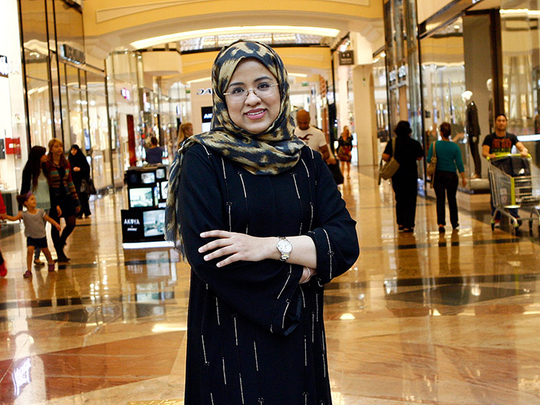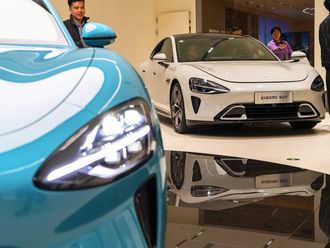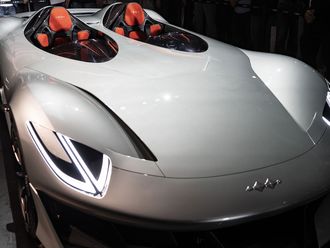
The Emirati displays a Dh50 note he’s just pulled out of his pocket. It’s a cool wintry evening at the Heritage Village down by Dubai Creek and this wrinkled old man has just shown some tourists how mere decades ago a pearl diver would clamp his nose closed with a fitam, a hand-carved, Y-shaped clip worn for up to two minutes at a time on as many as 40 dives a day. One of these clips costs Dh50 – khamseen, the man says in Arabic, only neither he nor the tourist making the purchase speak each other’s language. Not for the first time, sign language facilitates trade in Dubai.
“Trading is in our Emirati blood,” Laila Suhail, CEO of the Dubai Festivals and Retail Establishment (DFRE), which organises the Dubai Shopping Festival, tells GN Focus in a noisy café at one of the emirate’s big shiny malls. “It’s our heritage,” she adds, explaining how the city’s retail sector was born on the banks of the Creek in 1894, when Dubai was declared a tax-free port, a move that led to Deira’s souqs becoming the region’s first major draws for retail tourists.
Retail core
That DNA is at the heart of a new strategy for her department and for DSF, which returns to its retail roots this year. The 19th edition of the widely anticipated annual event begins today and runs through February 2, featuring a calendar of more than 150 events and sales and discounts at more than 6,000 shops with a new theme, Shop at your Best, covering cultural activities, dining out and shopping.
“DSF now accounts for 30 percent of annual retail sales in the emirate,” says Suhail. “It has also reinforced the city’s reputation as a global tourism landmark and complements Dubai’s position as the tourist destination of choice in the region by narrowing the gap between the tourism and retail sectors.” Over the years, attractive discounts and top-drawer events have helped DSF transform a traditionally weak retail period into one of the year’s strongest business seasons. Some 47 million visitors attended the past 18 editions, spending more than Dh114 billion.
DFRE, formerly the Dubai Events and Promotions Establishment, was last year brought under the Dubai Department of Tourism and Commerce Marketing and tasked with boosting the emirate’s economy in two ways: developing and organising wide-ranging commercial festivals and creating new prospects for city retailers.
Details of this new role will be announced later this month, and are in line with the Dubai government’s Tourism Vision for 2020. By then, the emirate anticipates 20 million tourists annually, up from 10 million in 2012, with several new malls in operation, including Mall of the World, Mall of Arabia and a new Outlet Village.
New festivals
The innovations include new festivals and promotions to boost the retail sector, Suhail explains. DFRE already runs DSF, first held in 1996 to invigorate a low business season, and DSS, which positions the city as a holiday destination in a season when temperatures can touch 50 degrees Celsius. In recent years, campaigns have also successfully been launched around the Eid and Ramadan holidays.
Suhail says the next step is to create consumer traction around new festivals. The inaugural Dubai Motor Festival last November was fashioned from the biannual Dubai International Motor Show, with add-ons such as a drifting championship and a parade of luxury and classic cars and bikes. Nearly 100,000 visitors attended, either to buy new cars or to eyeball the latest concepts.
Similar festivals around other themes are currently being planned, and at least one more event is expected to launch in 2014.
Shopping calendar
Along with Diwali, Christmas and Valentine’s Day, these will form a retail diary that Suhail hopes will enhance government-private sector co-operation. “The other main element of our mandate is a retail calendar of Dubai, which will help us work closely with retailers and help them align with our festivals and promotions,” she says. “It will also help us regulate promotions policy and make things more flexible for retailers to launch more exciting offers.”
Ruban Shanmugarajah, General Manager of the children’s concept store Babyshop, says a consolidated retail calendar can only help — provided it is available to the shopping public such as the event-focused Dubai Calendar. He thinks that as Dubai expands and shoppers drop their daily dirham at community centres instead of destination malls, retailers need stronger ties with customers. “A retail calendar will help maintain an active pipeline of promotional events and bring greater order and regulation in an increasingly competitive marketplace. It will positively impact trade because customers will know when they can expect the best shopping experiences,” he says.
Consumer expenditure in Dubai accounts for 57 per cent of total consumer spend in the UAE, research from market research firm Euromonitor shows. “This is mainly due to growing consumer confidence to spend, multichannel development, growing shopping mall developments, the shopping experience, lifestyle as well as government support of the retailing industry driving tourism,” says Research Analyst Fatemah Sherif. As regards to total annual retail spend, food and non-alcoholic beverages accounted for Dh54.3 trillion or 14 per cent of total expenditure in Dubai in 2012, while consumers spent about Dh27.9 trillion or 7 per cent of retail spend on clothing and footwear in 2012.
Citywide events
This year’s DSF gives tourists and residents a lot to look forward to — and spend on. More than 150 multicultural concerts and shows are being organised, including a two-week run by Canadian circus Cirque du Soleil, a weekend of Indian theatre with arthouse actor Naseeruddin Shah, Arabian performances by Amr Diab, Nancy Ajram and Omar Khairat, as well as the Paris Opera Ballet’s Middle East debut.
In the malls, in excess of Dh100 million in cash and kind will be raffled off in an attempt to heighten consumer spending. Prizes include half a kilogram of gold and three cars every day, a home makeover worth Dh100,000 from Mall of the Emirates and air tickets and trips. Community shopping centres are participating for the first time; Dh500,000 will be given to one raffle winner who spends Dh200 at the likes of Karama Centre or Union Co-Operative Society.
The widened catchment area is an attempt to take DSF to the furthest corners of Dubai, says Suhail. Though it attracts some of the year’s top entertainment, one criticism DSF faced last year was that the air of celebration was missing. In its early years, shopping streets such as Al Riqqa Road and Dhiyafah Street (now 2nd December Street), came alive with funfairs and carnivals.
“But that was Dubai at the time,” she says. “Now the whole city has expanded — it’s grown from five malls to more than 50.”
She explains how her team has recreated the festival mood this year. “We’ve put the focus on experiences instead and widened DSF to local malls, restaurants and to more streets than ever. We want you to feel DSF from the airport to the ends of the city, so there’ll be activations everywhere. At the airport, tourists will be welcomed. There’ll be fireworks by the Creek every night and folk dances on Al Seef Street. The spice and gold souqs will have special deals and street shows, the Downtown area will reflect Dubai’s luxury and glamour and there’ll also be a farmers’ market at Jumeirah Beach Residence.
“For the first time, more than 1,000 carnival performers from the world over will hit Dubai’s streets," she adds.
That’s not counting the Emirati cultural artists at the Shindagah Heritage and Diving Villages, where the spotlight is on traditional folklore groups, olde worlde games and bands, traditional food and falconry and camel shows. Much of that you won’t even need to pay Dh50 for.












